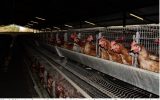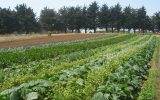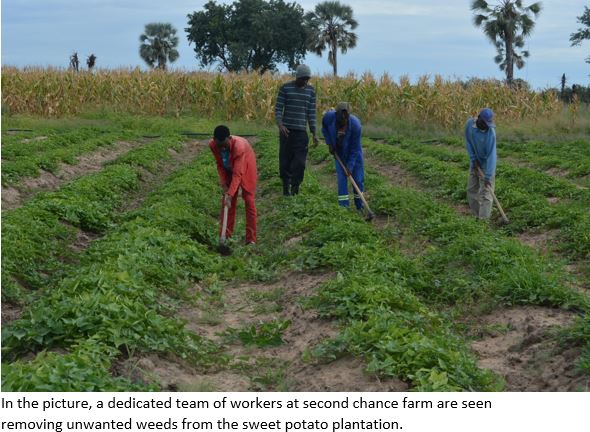What can you make use of the resources, that are at your disposal to produce something useful?
Most of the times, the opportunities to start doing something and succeed are not miles away from us in fact they lay within our reach, however they just want an awakening with an initiative of “just-start-doing”. Mr Epafras N. Hilengwa, the owner of second chance farm is a true reflection of the above said statement. Mr Epafras is the winner of the small scale horticulture producer of the year 2014. In 2017, he was the third (3rd) best medium scale horticulture producer throughout the country and in 2019, he won the overall award of the medium scale horticulture producer of the year. These awards are organised annually by the Namibia Agronomic Board (NAB). However, twelve (12) years ago, if you could have come across Mr Epafras and question him of the possibility of being an icon within the horticulture producer industry, he could have definitely shunned it away. Second chance farm, falls under the Olushandja produce association.
Mr Epafras underwent a major brain operation in 2008, which dearly affected him. After the operation, he lost his speech, hearing, concentration and he suffered a significant period with amnesia. In 2009, he was still not yet speaking properly but he slowly regain his speech, hearing, concentration and above all his memory. In February 2011, Mr Epafras decided to make use of the resources at his disposal, with his past experience in farming; he decided to establish a farm called Second Chance. On the farm, vegetables and fruits are grown. An array of small and big fruit trees of mangoes, guava and paw paws are seen. According to him, the name Second Chance gives praise to God for giving him another chance to live and make a living. The operation left him speech-impaired.
Initially, when the operation of Second Chance started in 2011, Mr Epafras started with his wife and until today they are still pushing together. When they started, he worked with his wife in the morning and during the afternoon, they were assisted by their children once they return from school. Today, the farm employs twelve (12) permanent staff with additional casual staffs which range from 10 – 100 during the harvesting season.
Mr Epafras have a vast amount of experience within the horticulture industry and as a result, Namfarmers team decided to pay a visit on his farm that is situated about ± 50 Km out of Outapi, on the road heading to Ruacana in Onanime village, Ombalantu, Omusati region. The purpose of the visit was to tap in his sea of knowledge so that he can share some tips and advice with his fellow farmers and the masses on how to go about when venturing in the horticultural sector.
This is what the Namfarmers team have acquired during the visitation as they interviewed Mr Epafras N. Hilengwa.
What consideration should be taken before one start practicing farming, particularly horticulture?
o Rule no 1: Get land, acquire even a little portion of land where your activities will be run.
o Rule no 2: To practice horticulture, you need to have access to water.
o Rule no 3: Know the condition of your soil. What state is your soil, is it in good health or does it lack some minerals? The point to carry home here is that, we have different type of soil and with different type of P.H scale, hence it is important to know your soil type and the variety of items that are suitable to grow in that specific soil type. Knowing the type of soil that you have before you start planting your items definitely gives you an upper hand. If you have to test the soil to find out of its condition, then go ahead and test it.
o Rule no 4: Consult your fellow farmers who have been involved in the industry for some time, so that they can impart and pass on the knowledge they have.
o Rule no 5: You need to save up some capital, either in the form of money or machinery.
o Rule no 6: Know the type of crops that you would want to start growing and also know the variety of medicine for disease or pest control that those specific crops need. Remember, preparation and being ready is key. Immediately, once you have chosen the crops that you will be growing at your farm, already go and buy the medication for disease control and pest control that goes hand-in-hand with those crops. You should not wait until the point you see the pest attacking your crops and that is when you would want to go and buy the medication. No, already be having the medication at your farm and ready in store before the pest even attack. Why? Because, pest and disease outbreak normally occur during unexpected time and by the time you will be running to the shops, the medication can be out of stock or might be more expensive at that point. Be fully prepared at the beginning.
o Rule no 7: Get quality seeds before you start planting your crops (Quality seeds & Quality soil are the blood line of cultivation). It would also be wise for you to identify the preferred season or the suitable season by which those crops are known to thrive in. Some crops, grow very well in summer hence plant them during that time and for some crops, they thrive well in winter, again grow them during that season.
o Rule no 8: What you grow, should be an item based on the market need/ demand. What are the people out there interested in? (Do your market research and analysis).
o Rule no 9: Communicate with others and gain knowledge from those involved in the same industry with you.
What technique do you use to improve the soil fertility of your farm ?
o Soil fertility is improved by using a variety of fertilisers, such as organic fertilisers or manure from livestock.
o Crop rotation also helps and plays a critical role in avoidance of crop diseases and is one of the good way for pest control measures.
o Another way, I improve my soil is that after harvesting crops such as maize , pearl millet or sorghum; the remaining stalk, we normally take a tractor and break them down or plough them down in an effort to combine them with the soil. In that way, the soil fertility will be improved and this is cost effective because it will help to reduce the fertilisers that I will be adding to the soil. For instance, if I was supposed to add 300 bags of NPK to the soil, it will be reduced to only 150 NPK. Why? Because, within the remaining stalk, there remains vital minerals and as you combine the stalk with the soil and they get to decompose, the minerals will be added back to the soil. Mr Epafras also gave caution, of when one uses inorganic fertilisers; firstly, they are expensive and secondly, after years in operation the inorganic fertilisers can degrade the quality of the soil.
Challenges experienced so far in the horticultural industry
Lack of formal market, where we can sell our produce. We do not have a formal market, we just sell to the open market and because of that, there are times whereby our produce do gets rotten because there are no customers.
There is a greater need of intervention whereby local farmers should be empowered to sell their produce in formal markets.
Message to Small scale producer and to those who want to venture in the horticulture industry
Farming is not a walk in the park, but it requires dedication, efforts and commitment. One just need to be working hard. According to him, he was also a small scale producer and hence one don`t have to be a small scale farmer until death. All that is needed is focus and growth, for all great achievements started small. For those that would want to venture in horticulture; being a farmer, you need to constantly be involved and being on the field for you to fully see and observe what is happening on ground level. Farming is a process that requires attention
Lessons to ponder on
o They started practicing on a small portion of land in 2011, just a small project.
Lesson: Start small and continuously learn and grow.
o He started with his wife.
Lesson: Two hands makes work lighter, if there is anyone willing to assist out when you are starting, take them along, get them on board and pull the wagon together.
Against all odds, not even a severe brain operation tumour could stop Mr Epafras from taking up initiatives in agriculture. Be on the lookout, the full broadcasted interview on Second Chance farm will be released soon.
For those interested in fresh veggies or other crops (maize, sorghum and pearl millet), Second Chance farm is ready to serve you.
Contact them today at: 081 283 5435 or
081 2060 754




















